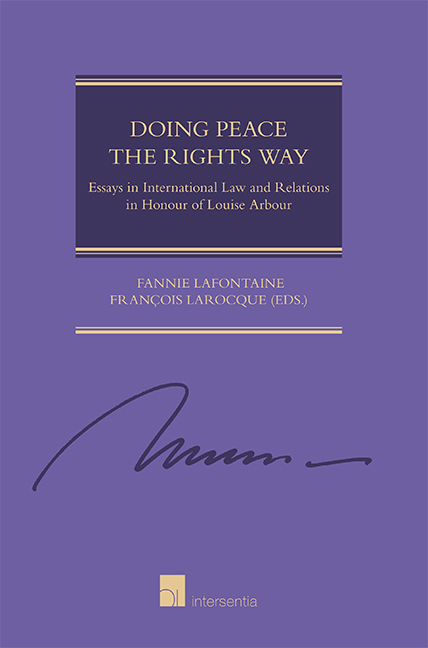Book contents
- Frontmatter
- Foreword
- Contents
- List of Contributors
- Introduction
- PART I OF FREEDOM AND EQUALITY
- PART II OF PEACE AND JUSTICE
- The Deterrence Rationale in a Criminal Justice Accountability Regime
- Peace and Justice: Human Rights Fact-Finding in Raging Conflicts
- “Exceptional Measures” in Times of Crisis: Terrorism, National Security and the Rule of Law
- When the End Lacks the Means: National Prosecutions of International Crimes and Canada's Paper Tiger Approach
- The Independence of International Prosecutors: Where Law Meets Realpolitik
- Torture, Jurisdiction and Immunity: Theories and Practices in Search of One Another
- Revisiting Challenges to International Humanitarian Law
- PART III OF WOMEN AND LEADERSHIP
- An Interview with the Honourable Madam Justice Louise Arbour
“Exceptional Measures” in Times of Crisis: Terrorism, National Security and the Rule of Law
from PART II - OF PEACE AND JUSTICE
Published online by Cambridge University Press: 13 April 2019
- Frontmatter
- Foreword
- Contents
- List of Contributors
- Introduction
- PART I OF FREEDOM AND EQUALITY
- PART II OF PEACE AND JUSTICE
- The Deterrence Rationale in a Criminal Justice Accountability Regime
- Peace and Justice: Human Rights Fact-Finding in Raging Conflicts
- “Exceptional Measures” in Times of Crisis: Terrorism, National Security and the Rule of Law
- When the End Lacks the Means: National Prosecutions of International Crimes and Canada's Paper Tiger Approach
- The Independence of International Prosecutors: Where Law Meets Realpolitik
- Torture, Jurisdiction and Immunity: Theories and Practices in Search of One Another
- Revisiting Challenges to International Humanitarian Law
- PART III OF WOMEN AND LEADERSHIP
- An Interview with the Honourable Madam Justice Louise Arbour
Summary
A decade ago, in a pivotal address at Chatham House in February 2006, Louise Arbour, the then United Nations (UN) High Commissioner for Human Rights, reflected on an environment referred to by some at that time as the “new normal.” She questioned whether the response of governments to the unprecedented threat posed by international terrorism following 9/11 meant that the world had entered a different legal landscape that presented a fundamental challenge to the protection of human rights. And with good cause. The “new normal” had raised a wide range of human rights issues. Among the hallmarks of the post-9/11 era identified by Arbour were challenges to the important safeguards regulating arrests and interrogations by law enforcement, and the role of national courts in supervising counter-terrorism measures, including fair trial rights and the use of special and military courts. There were problems with the way some governments sought to define terrorism and related offences in their national legislation, and in their determination of states of emergency and the existence of armed conflict. Challenges to the principle of non-discrimination, including the techniques used to screen terrorist suspects, and the protection of vulnerable groups, including human rights defenders, non-citizens and journalists, also raised concerns. The rights to privacy and to property were also challenged by new methods of investigation, information collection and sharing, and through the compilation of sanctions lists and the freezing assets of persons suspected of terrorism.
Particularly egregious and widespread, at that time, were questionable practices related to judicial and administrative detention, incommunicado detention and the secret detention of individuals suspected of terrorist activity. Arbour focused her remarks at Chatham House on two such issues: the alleged use of secret detention centres and irregular transfers of persons suspected of engagement in terrorist activities, and the use of diplomatic assurances to justify the return and transfer of suspects to countries where they would face a risk of torture. These practices, she suggested, characterized the “new normal.” They reflected the fact that terrorist suspects were being arrested, detained and interrogated with no apparent intention of bringing them to trial.
- Type
- Chapter
- Information
- Doing Peace the Rights WayEssays in International Law and Relations in Honour of Louise Arbour, pp. 199 - 220Publisher: IntersentiaPrint publication year: 2019



